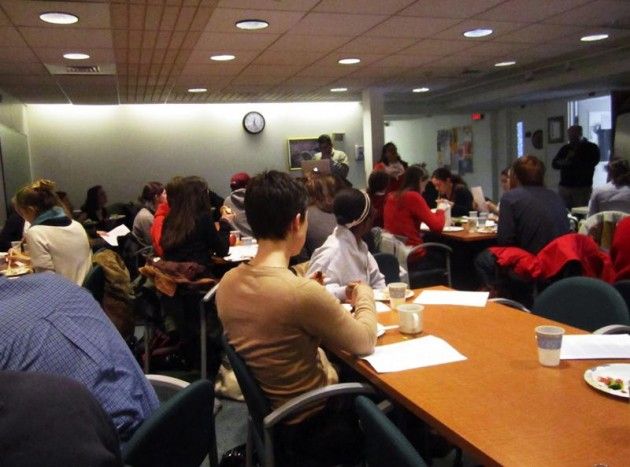Beyond Sensationalism: Writer Discusses Holocaust Literature
In her soft-spoken voice, writer and editor Ruth Franklin commanded, and oftentimes challenged, the minds of a large audience who came to hear her lecture in Persson Auditorium on February 3. The late-afternoon talk, which was sponsored by Jewish Studies with assistance from the Humanities Department and University Studies, focused on the writer’s recently published novel, A Thousand Darknesses: Lies and Truth in Holocaust Fiction.
“The subtitle is a provocation,” Franklin explained. “There’s a difference between writing a work of fiction about the Holocaust and recording events as they exactly happened.”
The Senior Editor of the New Republic and frequent contributor to the New Yorker went on to argue that many of the “heavy hitters” in Holocaust fiction, such as the works of Anne Frank and Elie Wiesel, were products of gradual revision that essentially changed their nature.
“Many people know that Anne Frank’s diary was edited by Otto Frank,” said Franklin. “However, Anne also edited her diary … she wanted an audience [for it]. She cut, clarified and expanded her entries. She revised up to 11 pages a day. It was then not a mere diary; it was a memoir in diary form.”
While Franklin was careful to emphasize her belief that these are genuine works recounting real events, she equally stressed her belief that “every canonical work of the Holocaust blurs the line between fiction and reality.”
“From the very moment, it is imagination at work,” explained the writer. “There’s this myth that Holocaust texts emerged fully-formed from their creators. However, so much rewriting was done to tell the story in a more effective, memorable way.”
Franklin’s main problem with this rewriting lies not with the actual author, but with the critic who puts “these books outside the bounds of criticism.”
“Many critics say that they must be respectful towards Holocaust literature. However, is this not just laziness?” Franklin posited.
“I believe it is not an act of disrespect to say Holocaust books are inseparable from others. In fact, not doing so would be dangerous because it opens up the opportunities for fraud,” she said.
Franklin then explained numerous instances where Holocaust authors, such as Binjamin Wilkomirski the author of Fragments, who were renowned and respected by critics, turned out to have fabricated part of or the entirety of their story. While Franklin ardently emphasized her belief that Holocaust exceptionalism is at fault for these incidences, some audience members wondered in the Q & A period if Franklin believed all Holocaust novels were in fact fabricated.
“It’s a mistake to see these few texts as a direct transmission of the Holocaust,” she answered patiently. “They are not purely holy. But they are as true as any memoir is true.
“It takes a million works to represent the voices of the Holocaust.”






